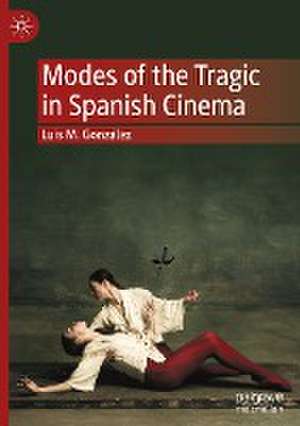Modes of the Tragic in Spanish Cinema
Autor Luis M. Gonzálezen Limba Engleză Hardback – 29 iun 2023
This book focuses on expressions of the tragic in Spanish cinema. Its main premise is that elements from the classical and modern tragic tradition persist and permeate many of the cultural works created in Spain, especially the films on which the book centers this study. The inscrutability and indolence of the gods, the mutability of fortune, the recurrent narratives of fall and redemption, the unavoidable clash between ethical forces, the tension between free will and fate, the violent resolution of both internal and external conflicts, and the overwhelming feelings of guilt that haunt the tragic heroine/hero are consistent aspects that traverse Spanish cinema as a response to universal queries about human suffering and death.
Preț: 697.32 lei
Preț vechi: 820.38 lei
-15% Nou
Puncte Express: 1046
Preț estimativ în valută:
133.47€ • 145.03$ • 112.19£
133.47€ • 145.03$ • 112.19£
Carte tipărită la comandă
Livrare economică 21 aprilie-05 mai
Preluare comenzi: 021 569.72.76
Specificații
ISBN-13: 9783031193248
ISBN-10: 3031193245
Pagini: 223
Ilustrații: X, 223 p. 32 illus.
Dimensiuni: 148 x 210 mm
Greutate: 0.43 kg
Ediția:2023
Editura: Springer International Publishing
Colecția Palgrave Macmillan
Locul publicării:Cham, Switzerland
ISBN-10: 3031193245
Pagini: 223
Ilustrații: X, 223 p. 32 illus.
Dimensiuni: 148 x 210 mm
Greutate: 0.43 kg
Ediția:2023
Editura: Springer International Publishing
Colecția Palgrave Macmillan
Locul publicării:Cham, Switzerland
Cuprins
1. Introduction.- 2. “Poetics of Fall and Redemption”.- 3. “The Condemned Land”.- 4. “Tragedy, Power and Resistance”.- 5. “The Cursed Love”.- 6. “Reversals of Fortune”.
Notă biografică
Luis M. González is Professor in the Hispanic Studies Department at Connecticut College, where he teaches Spanish Film, Literature and Culture. His publications on Spanish theater and film include the following books: La escena madrileña durante la II República (1931–1939), El teatro español durante la II República y la crítica de su tiempo (1931–1936), and Fascismo, kitsch y cine histórico en España (1939–1953). He also co-authored a translation of Valle Inclan´s Comedias Bárbaras into English, and he is the editor of Teatro: Revista de Estudios Escénicos .
Textul de pe ultima copertă
This book focuses on expressions of the tragic in Spanish cinema. Its main premise is that elements from the classical and modern tragic tradition persist and permeate many of the cultural works created in Spain, especially the films on which the book centers this study. The inscrutability and indolence of the gods, the mutability of fortune, the recurrent narratives of fall and redemption, the unavoidable clash between ethical forces, the tension between free will and fate, the violent resolution of both internal and external conflicts, and the overwhelming feelings of guilt that haunt the tragic heroine/hero are consistent aspects that traverse Spanish cinema as a response to universal queries about human suffering and death.
Luis M. González is Professor in the Hispanic Studies Department at Connecticut College, where he teaches Spanish Film, Literature and Culture. His publications on Spanish theater and film include thefollowing books: La escena madrileña durante la II República (1931–1939), El teatro español durante la II República y la crítica de su tiempo (1931–1936), and Fascismo, kitsch y cine histórico en España (1939–1953). He also co-authored a translation of Valle Inclan´s Comedias Bárbaras into English, and he is the editor of Teatro: Revista de Estudios Escénicos .
Caracteristici
Suggests that tragedy is not an artistic genre with set characteristics, but rather a dynamic/evolving “mode” Argues that, in spite of the death of tragedy as an artistic form, as often claimed by critics such as George Steiner Discusses eleven films by renowned directors such as Florián Rey, Miguel Picazo, Pedro Almodóvar and Paula Ortiz
